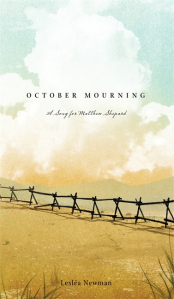October Mourning: A Song for Matthew Shepard
In her introduction to this historical novel in verse, Lesléa Newman writes about visiting the campus of the University of Wyoming as a keynote speaker for Gay Awareness Week just days after the murder of twenty-one-year-old Matthew Shepard. She details both the circumstances of his death and the reaction of herself and many, and explains that October Mourning: A Song for Matthew Shepard is her personal and poetic interpretation of what happened the night he was kidnapped, beaten, and left to die, and in the following days, including the trial. In the afterward, she writes more about her personal connection to the hate crime and the need for imagination on everyone’s part, something she exercises mightily in the sixty-eight poems between.
These are told from many points of view, beginning with that of the fence Matthew Shepard died on. The collection ends with a poem called “Pilgrimage,” a hopeful, prayerful poem set at the place where a new fence was put up near where the old one was taken down. In between the poet imagines deep fear, tremendous hate, and great love, taking the points of view of the victim, the murderers, Matthew’s parents and friends, the stars in the sky, and more, in haikus, villanelles, free verse, rhymed couplets and other forms. Some poems seem like very short stories, showing the way a friend, a policeman, someone in a hospital, and others change after hearing what happened. Reactions range from compassion to anti-gay protestors at the funeral – and the people dressed as angels with seven-foot wings to block them from view. Some poems begin with brief quotes from people, with sources noted in the back, which expand on the context. There are plenty of suggestions for further reading.
The poems will touch all readers with their power, and give a glimpse of history to readers too young to have heard about the crime. And as someone who’s old enough to have heard this as news, there was much that was new. Not only the voices, but moments built from lots of research about those involved, the time, and place, distilled into poems such as “What Twenty Bucks Could Get You in 1998,” which references the stolen wallet. The variety of voices make it clear how all people in many times and places are connected.
For more Poetry Friday, please visit sweet, smart Amy at The Poem Farm.






